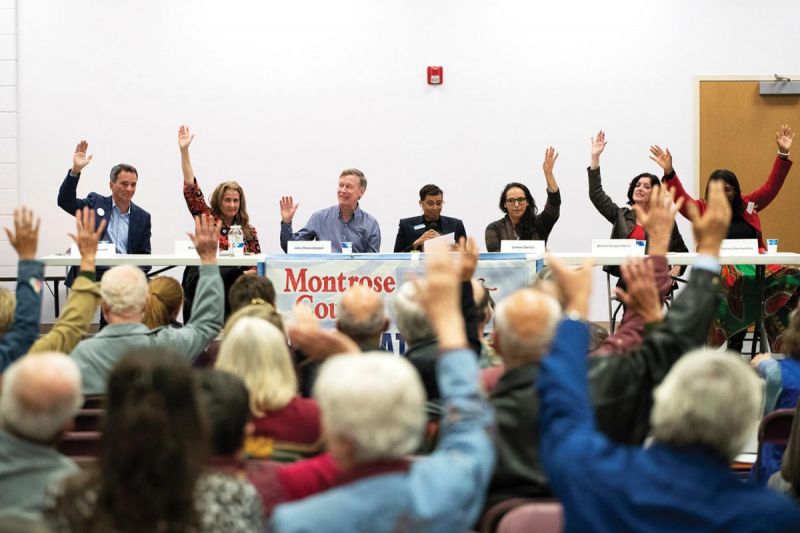Democratic candidates for the U.S. Senate raise their hands, along with members of the audience, in response to a poll asking if President Donald Trump has committed enough questionable actions to warrant impeachment during a forum held at Centennial Middle School in Montrose Sunday. (William Woody/ Special to the Montrose Daily Press)
Six Democratic candidates were in Montrose over the weekend to share their policy ideas and explain why they deserve the nomination to take on incumbent Sen. Cory Gardner (R-CO) for a seat on the U.S. Senate.
During the forum, held at Centennial Middle School Sunday afternoon in front of a gymnasium a little more than three-quarters full, the candidates spoke about their top policy priorities and even spoke about what, in their view, are the largest problems facing the Western Slope.
The Montrose County Democrats organized the event along with San Miguel, Ouray, Pitkin, Mesa and Delta counties, all of which had at least a few people in attendance.
The only remaining candidates not to attend were Angela Williams and Trish Zornio.
John Hickenlooper, the former governor of Colorado who recently ended his campaign for the U.S. presidency to pursue the Senate seat, sent a strong message to Gardner when it comes to campaign financing, saying he wants to end the prevalence of “dark money” in politics.
“(Gardner) has taken enormous amounts of political action committee money, PAC money, and then done what they directed him to do,” Hickenlooper told the crowd. “He received the benefit of over $4 million from the NRA. He is undermining and undercutting all our efforts around climate and our ability to protect our public lands.”
Hickenlooper is the newest candidate to the race, but he has more campaign money available to him than any candidate who took the stage, according to the Colorado Sun, which first reported he had $1.7 million in the bank at the end of September.
Another recurring talking point for Hickenlooper was expanding access to education, and not just for those who want to go to college. He said he will push for access to job and skills training for those who don’t want to pursue a college education, for whatever reason.
Of the remaining candidates (four dropped out after Hickenlooper announced his candidacy, including former frontrunner Mike Johnston) Andrew Romanoff, a former member of the Colorado House of Representatives and the House speaker from 2005 to 2009, has raised the second most money.
Sunday, he kept punching the same points he’s been punching during his campaign so far, the biggest of which is access to health care. He is a supporter of a single-payer system through Medicare that would give all Americans access to health care. He spoke about being better with taxes and instead of subsidizing insurance companies, using such funds to expand access to doctors and medicine for those who are uninsured.
Romanoff also used his time to try to set himself apart from the other candidates, talking about his endorsements and the support he’s received so far during his campaign.
Lorena Garcia, a nonprofit executive, spoke strongly about her support of Medicare for All and income inequality. She supports an immediate increase in minimum wage to $15 an hour. She is also a proponent of eliminating student debt.
Stephany Rose Spaulding, a Colorado Springs professor, like Garcia, supports canceling student loan debt and canceling student loans moving forward.
“Students don’t want loans anymore, so we have to make sure we’re moving toward a tuition-free education,” she said.
For climate, Spaulding, like Garcia and candidate Diana Bray, supports the Green New Deal. All candidates on stage claimed support for a system that eventually brings our country to a net-zero when it comes to fossil fuel emissions or dramatically decreases the country’s dependence on fossil fuels.
Bray’s campaign is built around fixing climate change, and candidate Michelle Ferrigno Warren also spoke for finding a solution to climate change.
Hickenlooper’s plan would bring the country to a net-zero in emissions by 2050.
Romanoff spoke about $650 billion in subsidies being provided to oil and gas companies.
“We’re paying polluters,” he said. “We ought to be spending that money instead on research and development for a clean energy infrastructure.”
One of the moments that elicited a big response from the crowd was a question to the entire panel of candidates. An audience member asked via a submitted index card how many candidates believe President Donald Trump has committed an impeachable offense.
Every candidate on the stage raised his or her hand.
The night ended with answers to a question about Gardner. An audience member asked how to address a friend who has certain ideas about Gardner they don’t believe to be true, such as the notion that he supports protection of public lands.
The candidates used that time to critique the Republican.
Justin Tubbs is the Montrose Daily Press’ managing editor. He can be reached at justint@montrosepress.com.
Montrose Daily Press | October 21, 2019
Print or download article

